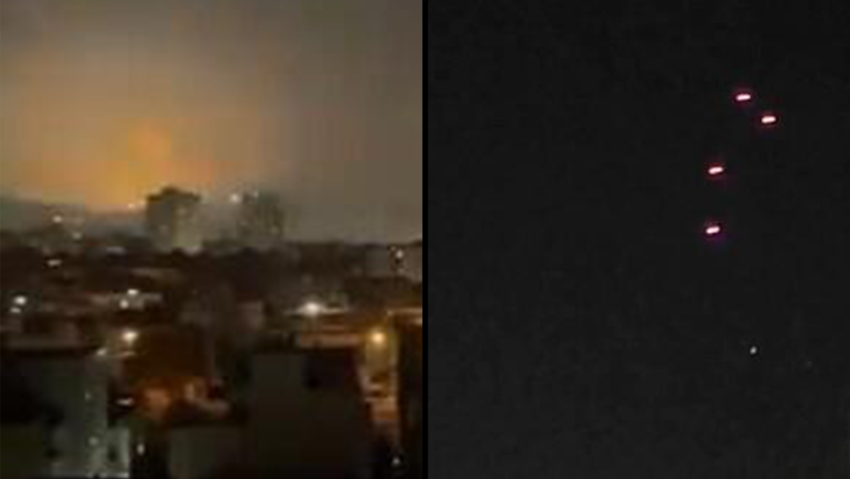"Iran appears to be at the most precarious moment in its modern history," Washington Post senior columnist David Ignatius wrote late Saturday. In his latest column, in which he interviewed, former Defense Minister Yoav Gallant, who is currently in the United States, Ignatius exposed the Israeli moves that damaged Tehran's strategic assets, which, along with the collapse of the Assad regime, has brought it to unprecedented weakness.
According to Ignatius, Iran's "proxy armies have been crushed in Gaza, Lebanon and Syria. And it appears to be nearly naked to attack after a wave of pinpoint Israeli airstrikes on its air defense system in October."
Gallant told Ignatius that "we showed that Iran is vulnerable,” and that the Israeli strikes on October 26 created “a window to act against Iran” before it produces a nuclear weapon. Ignatius wrote that U.S. decisions on how to exploit Iran's weakness - whether in negotiations for a nuclear agreement or in decisive military action - will be made by the next president, Donald Trump. He, for his part, told Time magazine that "anything can happen."
Israeli airstrikes on Iran on October 26, 2024
According to Ignatius, senior Biden administration officials are now seeing an opportunity for “coercive diplomacy” on the nuclear issue, with a weakened Iran. He noted that while Israel “played the decisive role in humbling Iran,” President Joe Biden has provided an important deterrent to it by deploying aircraft carriers, submarines and other U.S. military forces throughout the Middle East.
The aim of the attack on October 26 was to leave Iran defenseless against a future attack on its territory; Some 120 fighter jets participated in the raid, Ignatius reported, citing an Israeli military source, striking air defense radars and antiaircraft batteries that protect Tehran, as well as important factories for producing fuel for Iranian ballistic missiles. Although the attack was carried out in retaliation for the Iranian attack on October 1 , the planning began many months before that, Ignatius wrote.
Gallant told Ignatius that the mission, in simple terms, was to ensure that after the attacks “Iran is weaker and Israel is stronger,” so that Tehran will not be able to respond with force to future attacks. According to Ignatius, Israeli sources believe that in the next two years Iran will not be able to add a significant number of ballistic missiles to its arsenal, which remains large, and in the meantime its air defense has also been significantly damaged.
"Israel appears to have created a corridor into Iran, providing a clear path for its aircraft to strike Tehran," he wrote. "This is a new level of operational freedom, allowing Israel to attack targets in Iran nearly as easily as it did in Gaza and Lebanon."
The former defense minister also referred to Israel's first attack on Iran, on April 15 , when the war cabinet chose to respond in a limited manner with a targeted strike on a Russian-made S-300 battery near Isfahan, in order to send a message that would deter Tehran. "We hit them precisely, but it wasn't enough to deter them," Gallant said.
In the October attack, Israeli planes had already hit four such batteries around Tehran, even though their radars are supposed - in theory - to detect attacks from a distance of about 300 kilometers. Gallant emphasized that currently "there is no strategic defense around Tehran."
Along with this, key components of Iran's ballistic missile production capabilities were also reportedly damaged. The fighter jets hit all the mixers that produce solid fuel for these missiles, and the acquisition of new facilities "may take at least a year" - according to the Institute for the Study of War. Thus, the IDF strikes have halted, at least temporarily, the progress of Iran's ballistic missile program.
2 View gallery


Former Defense Minister Yoav Gallant tells the Washington Post that Israel 'will not hesitate to act' against Iran
(Photo: Yuval Chen )
An Israeli military source estimated to Ignatius that, before the October attack, Iran was able to produce enough solid fuel for two new ballistic missiles a day, and now its output is limited to one missile a week. This shortage, he said, will last for at least a year.
But Ignatius notes that, paradoxically, Iran's vulnerability could drive it to acquire a nuclear arsenal to deter its adversaries. Iran has enough fuel for a bomb, but estimates suggest it is many months away from being able to build a warhead that could be mounted on a long-range ballistic missile.
Get the Ynetnews app on your smartphone: Google Play: https://bit.ly/4eJ37pE | Apple App Store: https://bit.ly/3ZL7iNv
Now, if "coercive diplomacy" cannot prevent Iran from moving forward with its nuclear program, Israel and the United States may consider military action. Iran's nuclear facilities are buried deep in the ground, and estimates are that only the U.S. military has conventional weapons large enough to breach these bunkers. However, Gallant emphasized to Ignatius that although he hopes the U.S. and Israel will work together, “Israel has the means to strike Iranian assets in a precise, forceful and sophisticated manner. If needed, we will not hesitate to act.”
Ignatius concluded by calling the "looming standoff between Israel and Iran" as Trump's "most urgent and dangerous" challenge.




